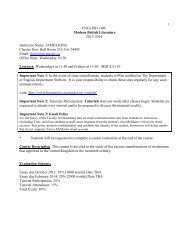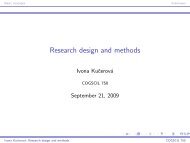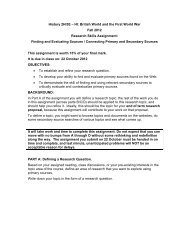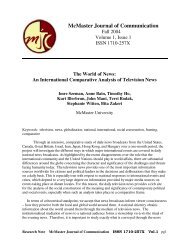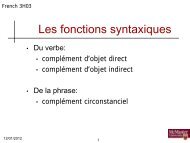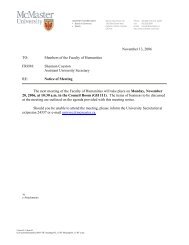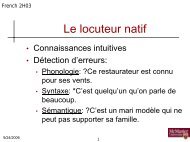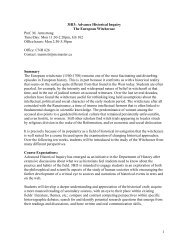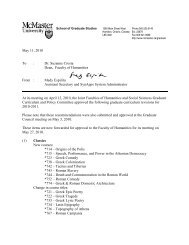The Syntax of Givenness Ivona Kucerová
The Syntax of Givenness Ivona Kucerová
The Syntax of Givenness Ivona Kucerová
Create successful ePaper yourself
Turn your PDF publications into a flip-book with our unique Google optimized e-Paper software.
‘I would like to eat something at Novak’s.’<br />
Furthermore, other lexical items that are semantically similar but at the same time can be<br />
stressed, such as ‘some food’, do not move, as can be seen in (138).<br />
(138) a. Chtěl bych jíst nějaké jídlo.<br />
wanted would.1sg eat.Inf some food<br />
‘I would like to eat some food.’<br />
b. Chtěl bych jíst polévku.<br />
wanted would.1sg eat.Inf soup<br />
‘I would like to eat some soup.’<br />
To summarize the observations so far, in Czech sentential prominence is realized only on<br />
the last prosodic word. For an element to be deaccented it is enough to move very locally.<br />
No cyclic movement is required (or licensed).<br />
I have already mentioned that in certain cases it is possible to realize prominence in a<br />
different part <strong>of</strong> the structure as well. For instance, if something is contrastively stressed,<br />
the immediately preceding prosodic word is deaccented. Thus, we predict that a stress-less<br />
word like ‘something’ does not need to evacuate the last position if the preceding word is<br />
contrastively stressed. This is indeed correct, as we can see in (139).<br />
(139) Chci JÍST něco. Ne, PÍT něco.<br />
want-I to-eat something no to-drink something<br />
‘I want to EAT something, not to DRINK something.’<br />
In general, there is an optionality in whether the contrastive element is stressed in situ or<br />
whether the contrastive element is realized as the last prosodic word, as in (140).<br />
(140) Chci něco JÍST, ne PÍT.<br />
want-I something to-eat no to-drink<br />
‘I want to EAT something not to DRINK something.’<br />
<strong>The</strong> examples in (139) and (140) are similar to the deaccented examples with hyponyms<br />
from the previous section. Consider again the example from (124) repeated below as (141).<br />
If the contrasted predicate ‘like’ stays in situ, as in (141-b), it gets stressed and the following<br />
prosodic word ‘paintings’ get deaccented. On the other hand, if the object ‘paintings’<br />
undergoes short movement, the predicate is assigned the main sentential stress.<br />
(141) a. Já mám obrazy RÁD.<br />
I have paintings liked<br />
b. Já mám RÁD obrazy.<br />
I have liked paintings<br />
‘I really LIKE paintings.’<br />
Notice that Czech does not seem to have the option <strong>of</strong> deaccenting an element by shifting<br />
the main sentential stress. <strong>The</strong> only way something can become deaccented is if its immediately<br />
preceding prosodic neighbor is independently stressed. <strong>The</strong> question that arises<br />
130



